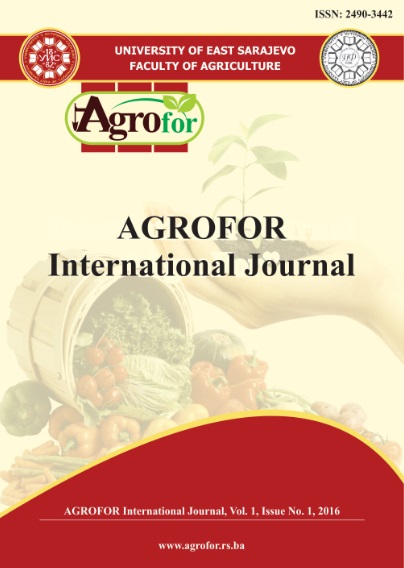DETERMINATION OF NATURAL RADIONUCLIDE IN PIG PRODUCTION CHAIN IN MACEDONIA BY GAMMA SPECTROMETRY
DOI:
https://doi.org/10.7251/AGRENG1601151NAbstract
Exposure of animals to ionizing irradiation may be a important pathway for
transfer of radionuclides to human food chain, thereby adding to the exposure
burden. Therefore, radiation control of animal feeds and animal products will
reduce risk for radioactive hazards to human health. The study was carried out in
order to detect the natural radioactivity in edible parts of pigs, excrements and
feeds in one commercial pig breeding farm in Macedonia. Therefore, 40K, 212Pb,
214Pb, 228Ac, 235U, 241Am, 212Bi, 214Bi, 232Th, 7Be and 226Ra were measured using
gamma spectrometry. Gamma spectrometer Canberra Packard with a high-purity
germanium detector and Marinelli beakers (1 l capacity) were used for the samples
measurement. The most prominent gamma energies observed in the spectra
belonged to the naturally occurring radionuclides 40K, 235U and 232Th. Other
nuclides if present occurred infrequently at low levels. The result show that 40K
made the largest contribution to the specific radioactivity in all the samples. The
mean activity concentration of the 40K in edible organs (kidney and liver), muscle,
excrements and feeds was: 73.39±9.109 Bq/kg; 111.26±3.88 Bq/kg; 298.80±38.51
Bq/kg; 83.60±10.279 Bq/kg, respectively. The 235U and 232Th were detectible only
in feed samples (0.53±0.293 Bq/kg; 163.69±23.791 Bq/kg, respectively) and
samples from excrements (0.25±0.021 Bq/kg; 58.17±1.062 Bq/kg, respectively).
The other radionuclides were detected only in few samples and the measured
activities were below the detection limit. If we take in consideration the activity
concentration of the most frequently occurred 40K found in all samples, than there
was statistical significant difference between radioactivity concentration in organs,
muscle, excrements and feeds (p<0.001).

